- Home
- Wendell Berry
New Collected Poems Page 6
New Collected Poems Read online
Page 6
6.
A warm day in December,
and the rain falling
steadily through the morning
as the man works
at his table, the window
staring into the valley
as though conscious
when he is not. The cold river
steams in the warm air.
It is rising. Already
the lowest willows
stand in the water
and the swift currents
fold round them.
The bare twigs of the elms
are beaded with bright drops
that grow slowly heavy
and fall, bigger
and slower than the rain.
A fox squirrel comes
through the trees, hurrying
someplace, but it seems
to be raining everywhere,
and he submits to wetness
and sits still, miserable
maybe, for an hour.
How sheltering and clear
the window seems, the dry fireheat
inside, and outside the gray
downpour. As the man works
the weather moves
upon his mind, its dreariness
a kind of comfort.
7.
Outside the window
is a roofed wooden tray
he fills with seeds for the birds.
They make a sort of dance
as they descend and light
and fly off at a slant
across the strictly divided
black sash. At first
they came fearfully, worried
by the man’s movements
inside the room. They watched
his eyes, and flew
when he looked. Now they expect
no harm from him
and forget he’s there.
They come into his vision,
unafraid. He keeps
a certain distance and quietness
in tribute to them.
That they ignore him
he takes in tribute to himself.
But they stay cautious
of each other, half afraid, unwilling
to be too close. They snatch
what they can carry and fly
into the trees. They flirt out
with tail or beak and waste
more sometimes then they eat.
And the man, knowing
the price of seed, wishes
they would take more care.
But they understand only
what is free, and he
can give only as they
will take. Thus they have
enlightened him. He buys
the seed, to make it free.
8.
The river is rising,
approaching the window
in awful nearness.
Over it the air holds
a tense premonition
of the water’s dark body
living where yesterday
things breathed. As he works
through the morning
the man has trouble
in the corner of his eye,
whole trees turning
in the channel as they go by,
the currents loaded
with the trash of the woods
and the trash of towns,
bearing down, and rising.
9.
There is a sort of vertical
geography that portions his life.
Outside, the chickadees
and titmice scrounge
his sunflower seed. The cardinals
feed like fires on mats of drift
lying on the currents
of the swollen river.
The air is a bridge
and they are free. He imagines
a necessary joy
in things that must fly
to eat. He is set apart
by the black grid of the window
and, below it, the table
of the contents of his mind:
notes and remnants,
uncompleted work,
unanswered mail,
unread books
—the subjects of conscience,
his yoke-fellow,
whose whispered accounting
has stopped one ear, leaving him
half deaf to the world.
Some pads of paper,
eleven pencils,
a leaky pen,
a jar of ink
are his powers. He’ll
never fly.
10.
Rising, the river
is wild. There is no end
to what one may imagine
whose lands and buildings
lie in its reach. To one
who has felt his little boat
taken this way and that
in the braided currents
it is beyond speech.
“What’s the river doing?”
“Coming up.”
In Port Royal, that begins
a submergence of minds.
Heads are darkened.
To the man at work
through the mornings
in the long-legged cabin
above the water, there is
an influence of the rise
that he feels in his footsoles
and in his belly
even when he thinks
of something else. The window
looks out, like a word,
upon the wordless, fact
dissolving into mystery, darkness
overtaking light.
And the water reaches a height
it can only fall from, leaving
the tree trunks wet.
It has made a roof
to its rising, and become
a domestic thing.
It lies down in its place
like a horse in his stall.
Facts emerge from it:
drift it has hung in the trees,
stranded cans and bottles,
new carving in the banks
—a place of change, changed.
It leaves a mystic plane
in the air, a membrane
of history stretched between
the silt-lines on the banks,
a depth that for months
the man will go from his window
down into, knowing
he goes within the reach
of a dark power: where
the birds are, fish
were.
11.
How fine
to have a long-legged house
with a many-glassed window
looking out on the river
—and the wren singing
on a winter morning! How fine
to sweep the floor,
opening the doors
to let the air change,
and then to sit down
in the freshened room,
day pouring in the window!
But this is only for a while.
This house was not always
here. Another stood
in its place, and weathered
and grew old. He tore it down
and used the good of it
to build this. And farther on
another stood
that is gone. Nobody
alive now knows
how it looked, though some
recall a springhouse
that is gone too now. The stones
strew the pasture grass
where a roan colt grazes
and lifts his head to snort
at commotions in the wind.
All passes, and the man
at work in the house
has mostly ceased to mind.
There will be pangs
of ending, and he regrets
the terrors men bring to men.
But all passes—th
ere is even
a kind of solace in that.
He has imagined animals
grazing at nightfall
on the place where his house stands.
Already his spirit
is with them, with a strange attentiveness,
hearing the grass
quietly tearing as they graze.
12.
The country where he lives
is haunted
by the ghost of an old forest.
In the cleared fields
where he gardens
and pastures his horses
it stood once,
and will return. There will be
a resurrection of the wild.
Already it stands in wait
at the pasture fences.
It is rising up
in the waste places of the cities.
When the fools of the capitals
have devoured each other
in righteousness,
and the machines have eaten
the rest of us, then
there will be the second coming
of the trees. They will come
straggling over the fences
slowly, but soon enough.
The highways will sound
with the feet of the wild herds,
returning. Beaver will ascend
the streams as the trees
close over them.
The wolf and the panther
will find their old ways
through the nights. Water
and air will flow clear.
Certain calamities
will have passed,
and certain pleasures.
The wind will do without
corners. How difficult
to think of it: miles and miles
and no window.
13.
Sometimes he thinks the earth
might be better without humans.
He’s ashamed of that.
It worries him,
him being a human, and needing
to think well of the others
in order to think well of himself.
And there are
a few he thinks well of,
a few he loves
as well as himself almost,
and he would like to say
better. But history
is so largely unforgivable.
And now his mighty government
wants to help everybody
even if it has to kill them
to do it—like the fellow in the story
who helped his neighbor to Heaven:
“I heard the Lord calling him,
Judge, and I sent him on.”
According to the government
everybody is just waiting
to be given a chance
to be like us. He can’t
go along with that.
Here is a thing, flesh of his flesh,
that he hates. He would like
a little assurance
that no one will destroy the world
for some good cause.
Until he dies, he would like his life
to pertain to the earth.
But there is something in him
that will wait, even
while he protests,
for things turn out as they will.
Out his window this morning
he saw nine ducks in flight,
and a hawk dive at his mate
in delight.
The day stands apart
from the calendar. There is a will
that receives it as enough.
He is given a fragment of time
in this fragment of the world.
He likes it pretty well.
14.
The longest night is past.
It is the blessed morning of the year.
Beyond the window, snow
in patches on the river bank,
frosty sunlight on the dry corn,
and buds on the water maples
red, red in the cold.
15.
The sycamore gathers
out of the sky, white
in the glance that looks up to it
through the black crisscross
of the window. But it is not a glance
that it offers itself to.
It is no lightning stroke
caught in the eye. It stays,
an old holding in place.
And its white is not so pure
as a glance would have it,
but emerges partially,
the tree’s renewal of itself,
among the mottled browns
and olives of the old bark.
Its dazzling comes into the sun
a little at a time
as though a god in it
is slowly revealing himself.
How often the man of the window
has studied its motley trunk,
the out-starting of its branches,
its smooth crotches,
its revelations of whiteness,
hoping to see beyond his glances,
the distorting geometry
of preconception and habit,
to know it beyond words.
All he has learned of it
does not add up to it.
There is a bird who nests in it
in the summer and seems to sing of it—
the quick lights among its leaves
—better than he can.
It is not by his imagining
its whiteness comes.
The world is greater than its words.
To speak of it the mind must bend.
16.
His mind gone from the window
into dark thought, suddenly
a flash of water
lights in the corner of his eye:
the kingfisher is rising,
laden, out of his plunge,
the water still subsiding
under the bare willow.
The window becomes a part
of his mind’s history, the entrance
of days into it. And awake
now, watching the water flow
beyond the glass, his mind
is watched by a spectre of itself
that is a window on the past.
Life steadily adding
its subtractions, it has fallen
to him to remember
and old man who, dying,
dreamed of his garden,
a harvest so bountiful
he couldn’t carry it home
—another who saw
in the flaws of the moon
a woman’s face
like a cameo.
17.
For a night and a day
his friend stayed here
on his way across the continent.
In the afternoon they walked
down from Port Royal
to the river, following
for a while the fall of Camp Branch
through the woods,
then crossing the ridge
and entering the woods again
on the valley rim. They talked
of history—men who saw visions
of crops where the woods stood
and stand again, the crops
gone. They ate the cold apples
they carried in their pockets.
They lay on a log in the sun
to rest, looking up
through bare branches at the sky.
They saw a nuthatch walk
in a loop on the side of a tree
in a late patch of light
while below them the Lexington
shoved sand up the river,
her diesels shaking the air.
They walked along trees
across ravines. Now his friend
is back on the highway, and he sits again
at his window. Another day.
/> During the night snow fell.
18.
The window grows fragile
in a time of war.
The man seated beneath it
feels its glass turn deadly.
He feels the nakedness
of his face and throat.
Its shards and splinters balance
in transparence, delicately
seamed. In the violence
of men against men, it will not last.
In any mind turned away
in hate, it will go blind,
Men spare one another
by will. When there is hate
it is joyous to kill. And he
has borne the hunger to destroy,
riding anger like a captain,
savage, exalted and blind.
There is war in his veins
like a loud song.
He has known his heart to rise
in glad holocaust against his kind,
and felt hard in thigh and arm
the thew of fury.
19.
Peace. May he waken
not too late from his wraths
to find his window still
clear in its wall, and the world
there. Within things
there is peace, and at the end
of things. It is the mind
turned away from the world
that turns against it.
The armed presidents stand
on deadly islands in the air,
overshadowing the crops.
Peace. Let men, who cannot be brothers
to themselves, be brothers
to mulleins and daisies
that have learned to live on the earth.
Let them understand the pride
of sycamores and thrushes
that receive the light gladly, and do not
think to illuminate themselves.
Let them know that the foxes and the owls
are joyous in their lives,
and their gayety is praise to the heavens,
and they do not raven with their minds.
In the night the devourer,
and in the morning all things
find the light a comfort.
Peace. The earth turns
against all living, in the end.
And when mind has not outraged
itself against its nature,
they die and become the place
they lived in. Peace to the bones
that walk in the sun toward death,
for they will come to it soon enough.
Let the phoebes return in spring
and build their nest of moss
in the porch rafters,
and in autumn let them depart.
Let the garden be planted,
and let the frost come.
Peace to the porch and the garden.
Peace to the man in the window.
20.
In the early morning dark

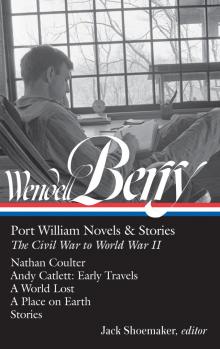 The Selected Poems of Wendell Berry
The Selected Poems of Wendell Berry Watch With Me
Watch With Me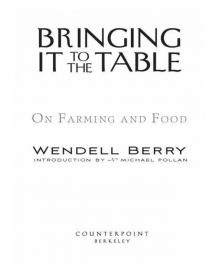 Bringing It to the Table: On Farming and Food
Bringing It to the Table: On Farming and Food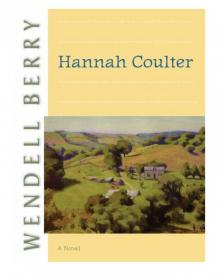 Hannah Coulter
Hannah Coulter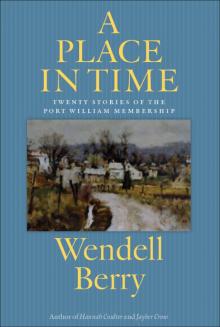 A Place in Time: Twenty Stories of the Port William Membership
A Place in Time: Twenty Stories of the Port William Membership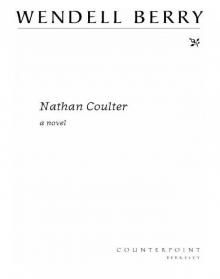 Nathan Coulter
Nathan Coulter Why I Am Not Going to Buy a Computer
Why I Am Not Going to Buy a Computer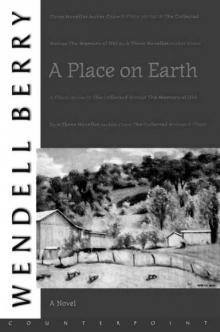 A Place on Earth
A Place on Earth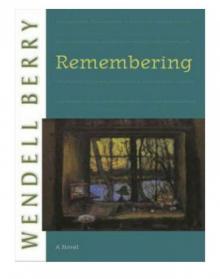 Remembering
Remembering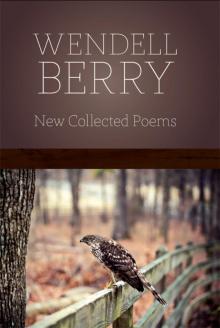 New Collected Poems
New Collected Poems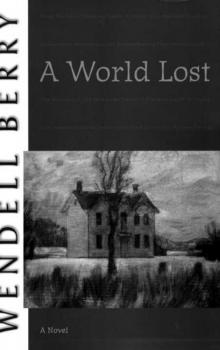 A World Lost
A World Lost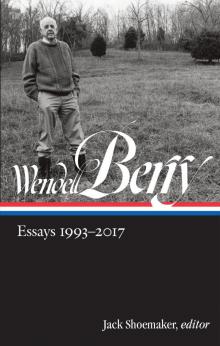 Wendell Berry
Wendell Berry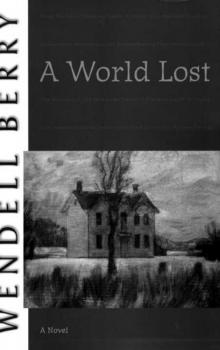 A World Lost: A Novel (Port William)
A World Lost: A Novel (Port William) Fidelity
Fidelity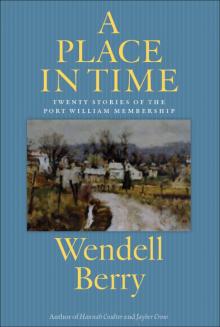 A Place in Time
A Place in Time